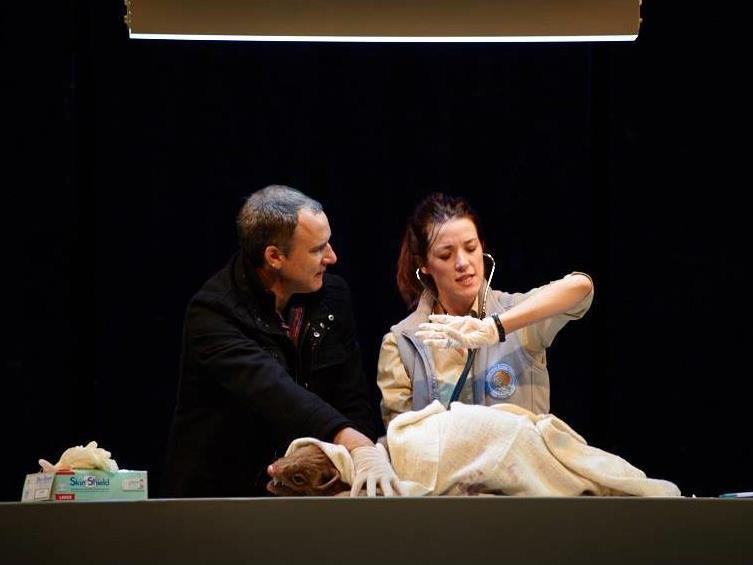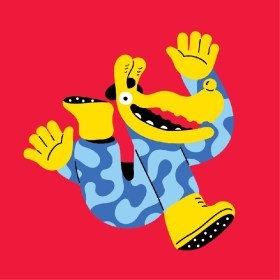Distraught Harry hits a tiger quoll with his car on a stormy night in the Otways. Rushing the animal to the nearest veterinary surgery, he meets American zoologist Piper and they soothe the injured creature as best they can until the return of the local vet, Andy.
Andy observes that the creature’s spinal column is broken and promptly euthanises the quoll, provoking anger and outrage. Piper, Andy’s girlfriend, cannot believe his cavalier treatment of the first quoll seen in the area for over a decade, while Harry is impressed by Piper as much as he is disgusted by Andy.
Heather is Andy’s sister and Piper’s boss, administering scientific research and developing her own index of viability for endangered species, an algorithm for policy. Heather’s pragmatic, numbers-driven approach seeks to maximise ecological outcomes for economic investment, a philosophy dramatically at odds with Piper’s intense emotional response to conservation issues.
Harry turns out to be a mining executive, proposing to develop brown coal reserves on agricultural land near the forest, using profits from the venture to fund conservation efforts for the tiger quoll. Heather and Piper are initially against it, but the combination of Harry’s charisma and funding proves irresistible, to Andy’s disgust. Against this backdrop of moral and environmental compromises, a human drama of secrets, lies, sex and money unfolds, while nobody knows if there even is another quoll left to save.
Hannie Rayson’s script, crammed full of issues, concepts, dilemmas and observations about the modern world, is consistently compelling and clever. Director Stuart Halusz contrives to have each aspect stand out on its own merits, pacing the performers to allow the audience time to appreciate the many nuggets of wisdom contained in the text, from inter-personal relationships to economic pressures to Vice-Chancellors’ obsessions with “legacy”. The big thoughts around death and grief are not neglected in the withering scorn piled upon the naivety of a certain type of environmental activist, and repeated arguments for the continued use of fossil fuels become their own motif, marking character development.
The four performers are well-matched, with balanced stage presence. Each player poses to create striking silhouettes in the scene changes, a graceful element providing pensive pauses without losing narrative momentum. Myles Pollard strides out with his broad shoulders, square jaw and gumboots to be the no-nonsense, no-compromise country vet Andy, living by his convictions and demanding the same from his loved ones. His reluctance to share secrets adds challenging depth to his part, which Pollard conveys with brutal honesty.
Sarah McNeill’s Heather is strong, smart and perfectly times her scathing reactions. A complex role of an experienced negotiator, adept at dealing with her professional life but brittle in her personal relationships, McNeill brings conviction to a flawed human that demands maturity and courage to inject life experience into its portrayal. While McNeill delivers Heather’s dry witticisms with precision, Hannah Day presents Piper’s contrasting emotional abandon with gusto. Despite tears over a sick dog, passionate youthful declarations about ethical living and constant personal involvement in ethical issues, Day makes Piper more than a type, a bundle of conflicts in the midst of manipulations. Day’s vivacious Piper is more than a young pair of legs, and her attraction for Matt Dyktynski’s Harry is clear. While Dyktynski presents a devious charmer from the big end of town, his revelations about his well-meaning intentions do not ring false. Dyktynski delivers the many levels of Harry’s character: self-obsession, love of nature, devastation at the shock of divorce, ability to read and manipulate people around him, and determination to get his own way.
Each character comes with their own strengths and weaknesses, and each performer delivers the entire package in a believable way.
The Heath Ledger Theatre is a stunning venue, and Bryan Woltjen’s set design draws the eye while keeping each scene distinct. Clean, constructed edges delineate the vet surgery, Heather’s modern inner-city apartment and the slightly shabby academic office, accentuated by intelligent use of screens and projections. Scene changes run smoothly, while Trent Suidgeest’s lighting provides stark scenes with beautiful “external” features and Ben Collins’ soundscapes immerse us in the relevant settings. The stand out stage trick is opening the second half with a totally different rainforest scene, opening the carefully framed performance space and filling it with dense trunks and greenery, stepping away from the built settings entirely for a stunning single scene.
The threat to Australia’s species is real, and Rayson has extensively researched aspects of wildlife rescue, ecological research and the tiger quoll itself to communicate the multi-layered challenges stacked against species’ survival. The enthusiasm of the director and cast make these conundrums leap from the page to the stage, bringing a vivid and engaging work to win hearts, minds and hopefully inspire awareness and action in place of apathetic acceptance, whether we flawed human beings respond with analytical detachment, targeted passion or emotional immersion.
4 ½ stars out of 5
Extinction
By Hannie Rayson
Presented by Black Swan State Theatre Company
Director: Stuart Halusz
Set & Costume Designer: Bryan Woltjen
Lighting Designer: Trent Suidgeest
Sound Design/Composer: Ben Collins
Fight Director: Andy Fraser
Performed by Hannah Day, Matt Dyktynski, Sarah McNeil and Myles Pollard
Heath Ledger Theatre, State Theatre Centre of Western Australia
19 September – 4 October 2015





